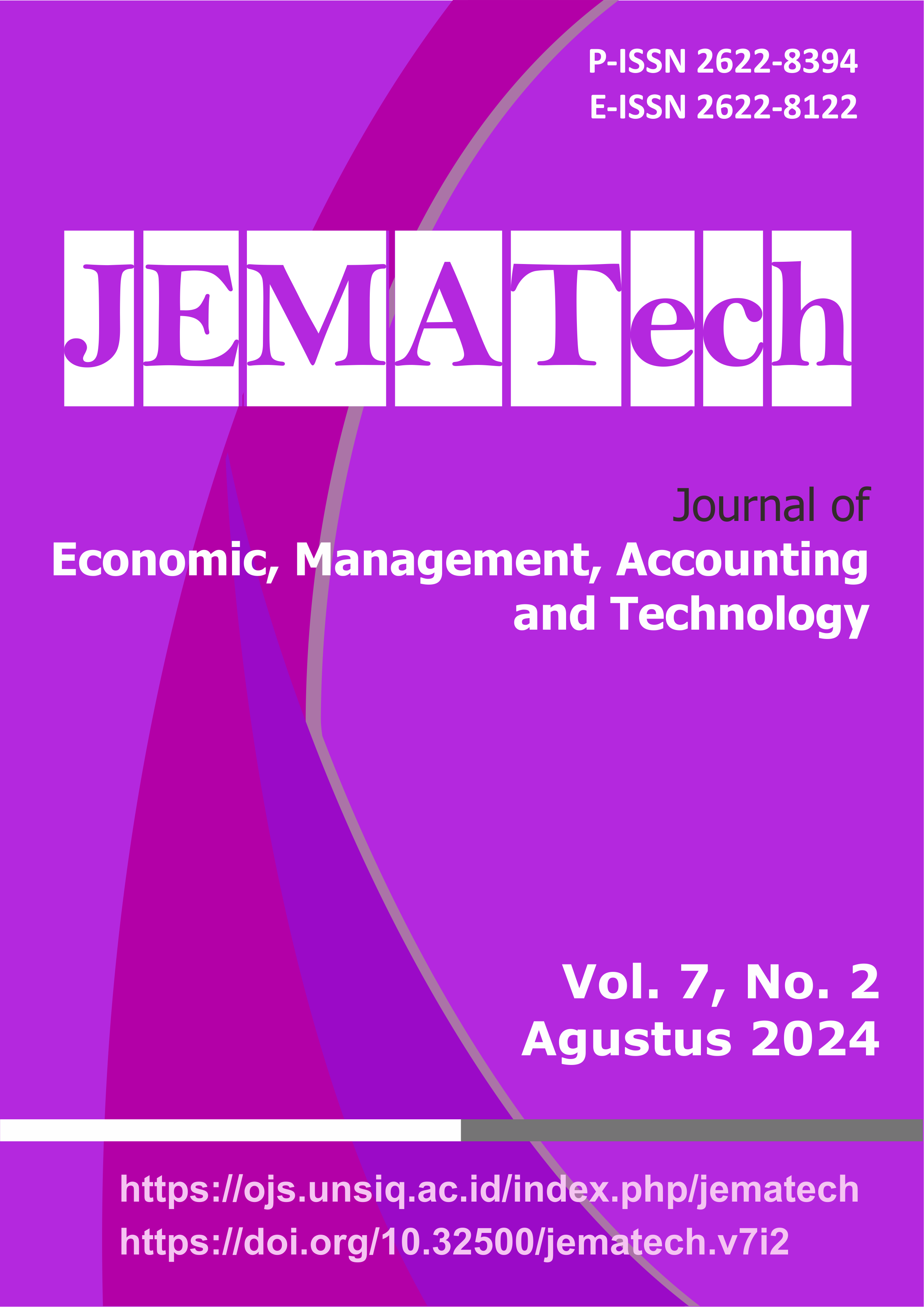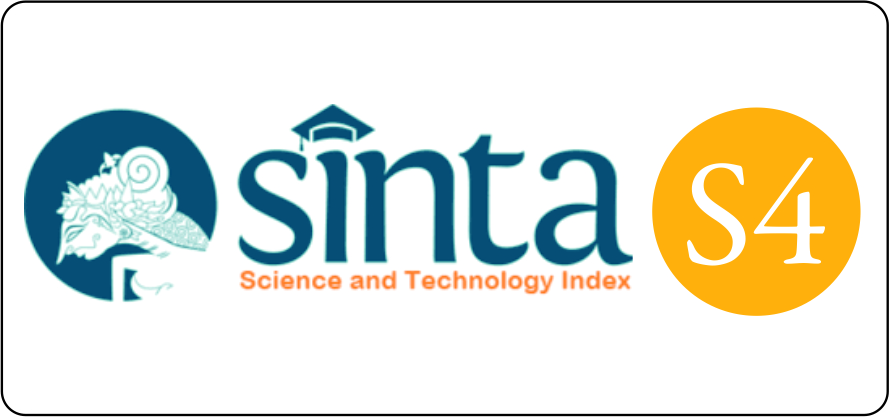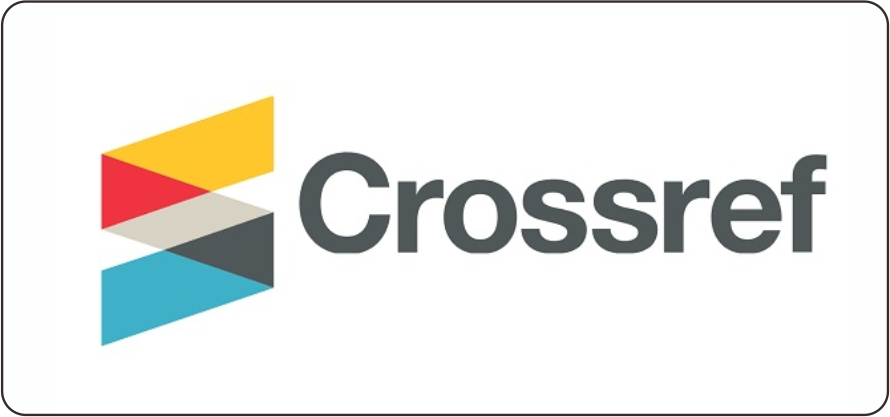The Mediating Role of Innovation on the Relationship Between Knowledge Management, Organizational Learning, and SME Performance
DOI:
https://doi.org/10.32500/jematech.v7i2.9203Keywords:
The Mediating Role of Innovation, Relationship Between Knowledge Management, Organizational Learning, SME PerformanceAbstract
In today's business landscape, innovation has become a critical determinant for organizational survival and competitiveness in an increasingly volatile industrial environment. Companies must strategically manage their knowledge and organizational learning while fostering an innovation-driven culture to optimize performance outcomes. Based on this rationale, the present study investigates how innovation mediates the influence of knowledge management and organizational learning on organizational performance. The research gathered data from 200 SME entrepreneurs in South Sulawesi through a structured questionnaire. Data analysis was performed using the Partial Least Squares (PLS) method. Findings reveal that both knowledge management and organizational learning exert direct, positive, and significant impacts on performance. Furthermore, both also positively influence innovation, which in turn significantly boosts performance. Notably, innovation also acts as a significant mediating mechanism between knowledge management, organizational learning, and performance in SMEs."
References
Alavi, M., Visentin, D. C., Thapa, D. K., Hunt, G. E., Watson, R., & Cleary, M. (2020). Exploratory factor analysis and principal component analysis in clinical studies: Which one should you use. Journal of Advanced Nursing, 76(8), 1886-1889.
Al-Ansari, Y., Pervan, S., & Xu, J. (2013). Innovation and business performance of SMEs: The case of Dubai. Education, Business and Society: Contemporary Middle Eastern Issues, 6(3), 162–180. https://doi.org/10.1108/EBS-04-2013-0012
Al‐Hakim, L., & Hassan, S. (2013). Knowledge management strategies, innovation, and organisational performance: An empirical study of the Iraqi MTS. Journal of Advances in Management Research. 10(1), 58-71. https://doi.org/10.1108
Axelrod, E. L., Handfield-Jones, H., & Welsh, T. a. (2001). War for talent , part two. McKinsey Quarterly, 2(January), 9–11.
Barney, J. (1991). Firm Resources and Sustained Competitive Advantage. Journal of Management, 17(1), 99–120.
Brattberg, E. (2017). Strengthening partnerships. IHS Jane’s Defence Weekly, 54(4) 26–29. https://doi.org/10.18574/nyu/9780814717189.003.0 007
Byukusenge, E., & Munene, J. C. (2017). Knowledge management and business performance: Does innovation matter? Cogent Business and Management, 4(1), 1-18 https://doi.org/10.1080/23311975.2017.1368434
Chinowsky, P., & Carrillo, P. (2007). Knowledge Management to Learning Organization Connection. Journal of Management in Engineering, 23(3), 122– 130. https://doi.org/10.1061/(asce)0742597x(2007)23:3( 122)
Collings, D. G., Mellahi, K., & Cascio, W. F. (2019). Global Talent Management and Performance in Multinational Enterprises: A Multilevel Perspective. Journal of Management, 45(2), 540–566. https://doi.org/10.1177/0149206318757018
Damanpour, Fariborz. (1991). Organizational Innovation. : A.Meta Analysis of Effects of Determinants and Moderators. The Academy of Management Journal, 34(3), 555-590. https://doi.org/10.2307/256406
Distanont, A., & Khongmalai, O. (2020). The role of innovation in creating a competitive advantage. Kasetsart Journal of Social Sciences, 41(1), 15–21. https://doi.org/10.1016/j.kjss.2018.07.009
Fahroni, R., & Tjakraatmadja, J. H. (2013). Implementation of Knowledge Management for Business Competitiveness in Provecta Capital ( Venture Capital ). The Indonesian Journal of Business Administration, 2(11), 1248–1262
Fernandez,I.B & Sabherwal,R. (2015) Knowledge Management: Systems and Processes. Routledge.711 third Avenue, New York NY 10017
Garanina, T. (2009). The role of intangible assets in value creation: case of Russian companies. Perspectives of Innovations, Economics and Business, 2(2), 92–94. https://doi.org/10.15208/pieb.2009.66
Govori, A. (2013). Factors affecting the growth and development of SMEs: Experiences from Kosovo. Mediterranean Journal of Social Sciences, 4(9), 701–708. https://doi.org/10.5901/mjss.2013.v4n9p701
\Grant, Robert. M. (1991). The Resource-Based Theory of Competitive Advantage: Implication for Strategy Formulation. California Managemen Review. SAGE Publication. 33(3), 114-135.https://doi.org/10.2307/41166664.
Haroon Hafeez, M., Noor Mohd Shariff, M., & bin Mad Lazim, H. (2012). Relationship between Entrepreneurial Orientation, Firm Resources, SME Branding and Firm’s Performance: Is Innovation the Missing Link? American Journal of Industrial and Business Management, 02(04), 153–159. https://doi.org/10.4236/ajibm.2012.24020
Hassan, N., & Raziq, A. (2019). Effects of knowledge management practices on innovation in SMEs. Management Science Letters, 9(7), 997–1008. https://doi.org/10.5267/j.msl.2019.4.005
Hidayat, M., LATIEF, F., WIDIAWATI, A., ASBARA, N. W., & ZAENI, N. (2021). Factors Supporting Business and its Distrubution to Business Resilience In New Normal Era. Journal of Distribution Science, 19(11), 5-15.
Hilmi, M. F., & Ramayah, T. (2009). Market Innovativeness of Malaysian SMEs: Preliminary Results from a First Wave Data Collection. Asian Social Science, 4(12), 42-49. https://doi.org/10.5539/ass.v4n12p42
Horvathova, P., & Durdova, I. (2010). The level of talent management usage at human resources management in organizations of the Moravian-Silesian Region. Business and Economic Horizons, 3 (October 2010), 58–67. https://doi.org/10.15208/beh.2010.27
Jerez-Gomez, P., Céspedes-Lorente, J., & Valle-Cabrera, R. (2005). Organizational learning capability: a proposal of measurement. Journal of business research, 58(6), 715-725.
Khan, V., Hafeez, H., Rizvi, S. M. H., Hasnain, A., & Mariam, A. (2012). Relationship of leadership styles, employees commitment and organization performance (a study on customer support representatives). European Journal of Economics, Finance and Administrative Sciences, (49), 133–143
Lyria, R. K. (2014). Effect of Talent Management on Organizational Performance in Companies Listed in Nairobi Securities Exchange in Kenya. International Journal of Business, Humanities and Technology, 2(3), 65–70.
Ma’atoofi, A. R., & Tajeddini, K. (2010). The Effect of Entrepreneurship Orientation on Learning Orientation and Innovation: A Study of Small-Sized Business Firms in Iran. International Journal of Trade, Economics and Finance, 1(3), 254–260. https://doi.org/10.7763/ijtef.2010.v1.46
Mardani, A., Nikoosokhan, S., Moradi, M., & Doustar, M. (2018). The Relationship Between Knowledge Management and Innovation Performance. The Journal of High Technology Management Research, 29(1),12–26. https://doi.org/https://doi.org/10.1016/j.hitech.2018. 04.002
Marr, B., & Spender, J. C. (2004). Measuring knowledge assets – implications of the knowledge economy for performance measurement. Measuring Business Excellence, 8(1), 18–27. https://doi.org/10.1108/13683040410524702
Mazla,M. I. S. Bin, Jabor, M. K. Bin, Tufail, K., Yakim, A. F. N., & Zainal, H. (2020). The Roles of Creativity and Innovation in Entrepreneurship. Advances in Social Science Education and Humanities Research, 470(ICoSD 2019), 213–217. https://doi.org/10.2991/assehr.k.200921.035
Mohajan, K. (2017). The Roles of Knowledge Management for the Development of Organizations. Journal of Scientific Achievements, 2(2), 1–27.
Ng.P.K., Goh.G.G.G., & Eze.U.C. (2011). The role of knowledge management in product development performance: A review. Journal of Knowledge Management Practice, 12(1). 1-15.
Nonaka, I, Toyama, R., & Konno, N. (2002). SECI, Ba, and Leadership : a Unified Model of Dynamic Knowledge Creation. Managing Industrial Knowledge - Creation, Transfer and Utilization, Long Range Planing 33 (1) 5 – 34 DOI:10.1016/S0024-6301(99)00115-6
Nonaka, Ikujiro, & Lewin, A. Y. (1994). A Dynamic Theory of Organizational Knowledge Creation. Organization Science, 5(1), 14–37.
Nonaka, Ikujirō, o Nonaka, I., Ikujiro, N., & Takeuchi, H. (1995). The knowledge-creating company: How Japanese companies create the dynamics of innovation (Vol. 105). 1-134 Oxford University Press. USA.
Omerzel, D. G. (2010). The impact of knowledge management on SME growth and profitability: A structural equation modelling study. African Journal of Business Management, 4(16), 3417–3432.
Omotayo, F. O. (2015). Knowledge management as an important tool in organisational management: A eview of literature. Library Philosophy and Practice(e-journal) Spring 4–10 (2015). 1-23. University of Nebraska-Lincoln.
Panjaitan, J. M. P., Timur, R. P., & Sumiyana, S. (2021). How does the Government of Indonesia empower SMEs? An analysis of the social cognition found in newspapers. Journal of Entrepreneurship in University-Industry-Research collaborative innovation from the perspective of knowledge management. Cognitive Systems Research, 52, 995–1003. https://doi.org/10.1016/j.cogsys.2018.09.020 Emerging Economies, 13(5),765–790. https://doi.org/10.1108/JEEE-04-2020-0087
Sirinaga, I. P. W., Khatibi, A., & Azam, S. M. F. (2020). The Effect of Knowledge Management and Employee Training on Performance of Small and Medium- scaled Enterprises (SMEs): Employee Training as a Mediator. European Journal of Human Resource Management Studies, 04(01), 1-https://doi.org/10.5281/zenodo.3627751
Valdez-Juárez, L. E., De Lema, D. G. P., & Maldonado- Guzmán, G. (2016). Management of knowledge, innovation and performance in SMEs. Interdisciplinary Journal of Information, Knowledge, and Management, 11(April 2018), 141– 176. https://doi.org/10.28945/3455
van den Broek, J., Boselie, P., & Paauwe, J. (2018). Cooperative innovation through a talent management pool: A qualitative study on coopetition in healthcare. European Management Journal, 36(1),135–144. https://doi.org/10.1016/j.emj.2017.03.012
Wiklund, J., & Shepherd, D. (2003). Knowledge-based resources, entrepreneurial orientation, and the performance of small and medium-sized businesses. Strategic Management Journal, 24(13), 1307–1314. https://doi.org/10.1002/smj.360
Xu, J., Hou, Q., Niu, C., Wang, Y., & Xie, Y. (2018). Process optimization of the organizational effectiveness: Mediating role of knowledge management. Journal of Business Research. 63(7) 763-771. https://doi.org/10.1016/j- jbusrees.2009.06.005
Zheng, W., Yang, B., & McLean, G. N. (2010). Linking organizational culture, structure, strategy, and organizational effectiveness: Mediating role of knowledge management. Journal of Business Research, 63(7), 763–771.











